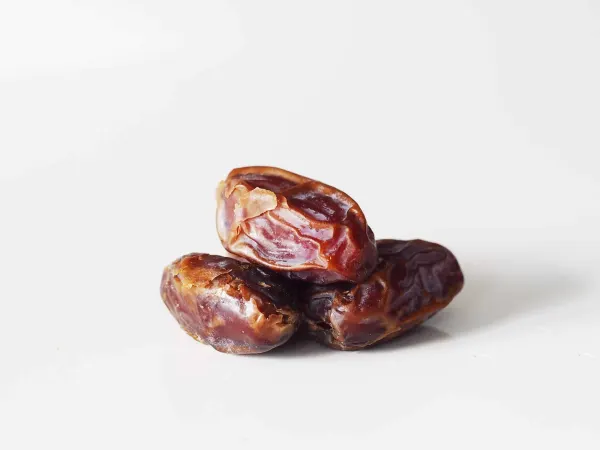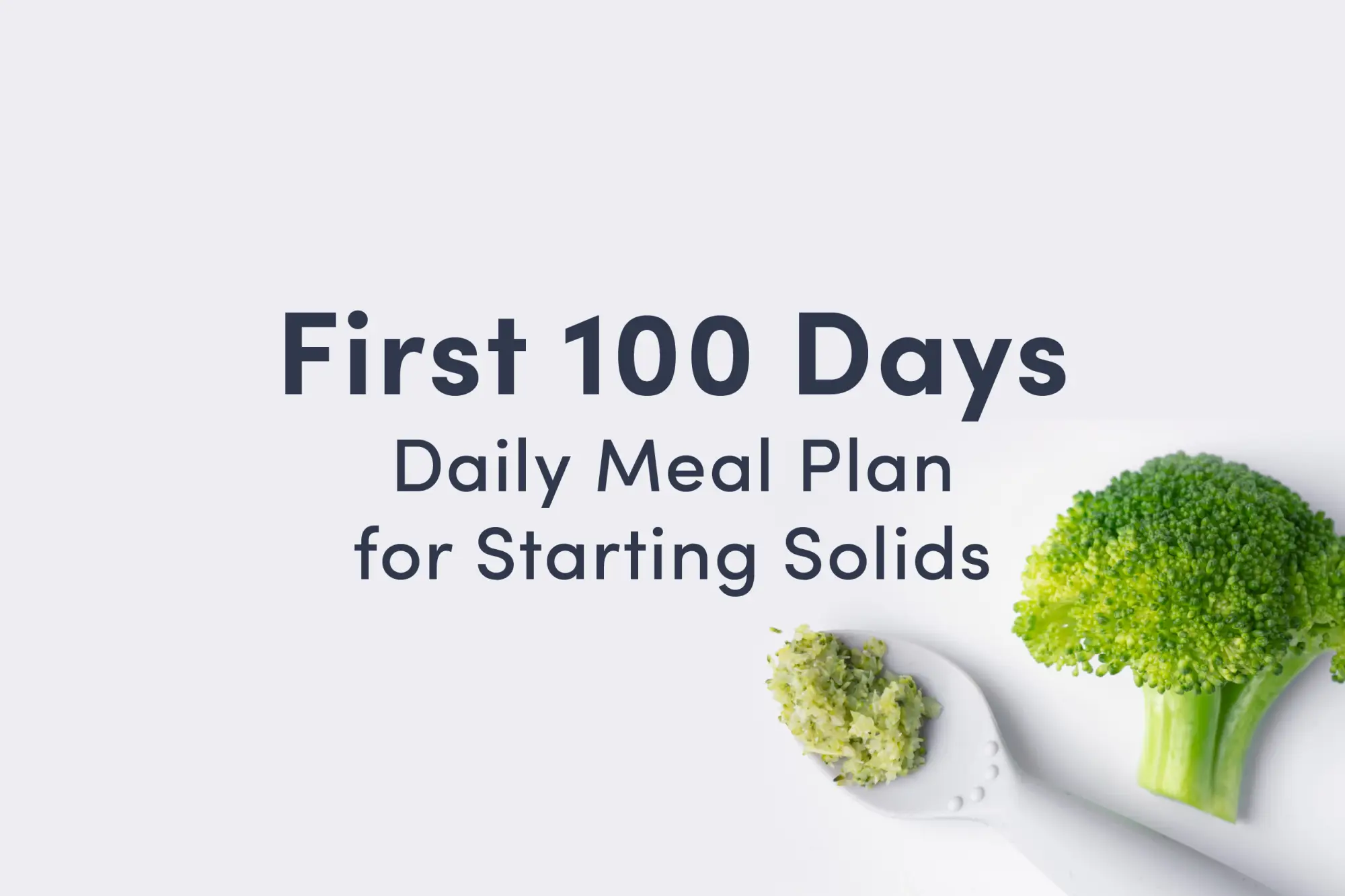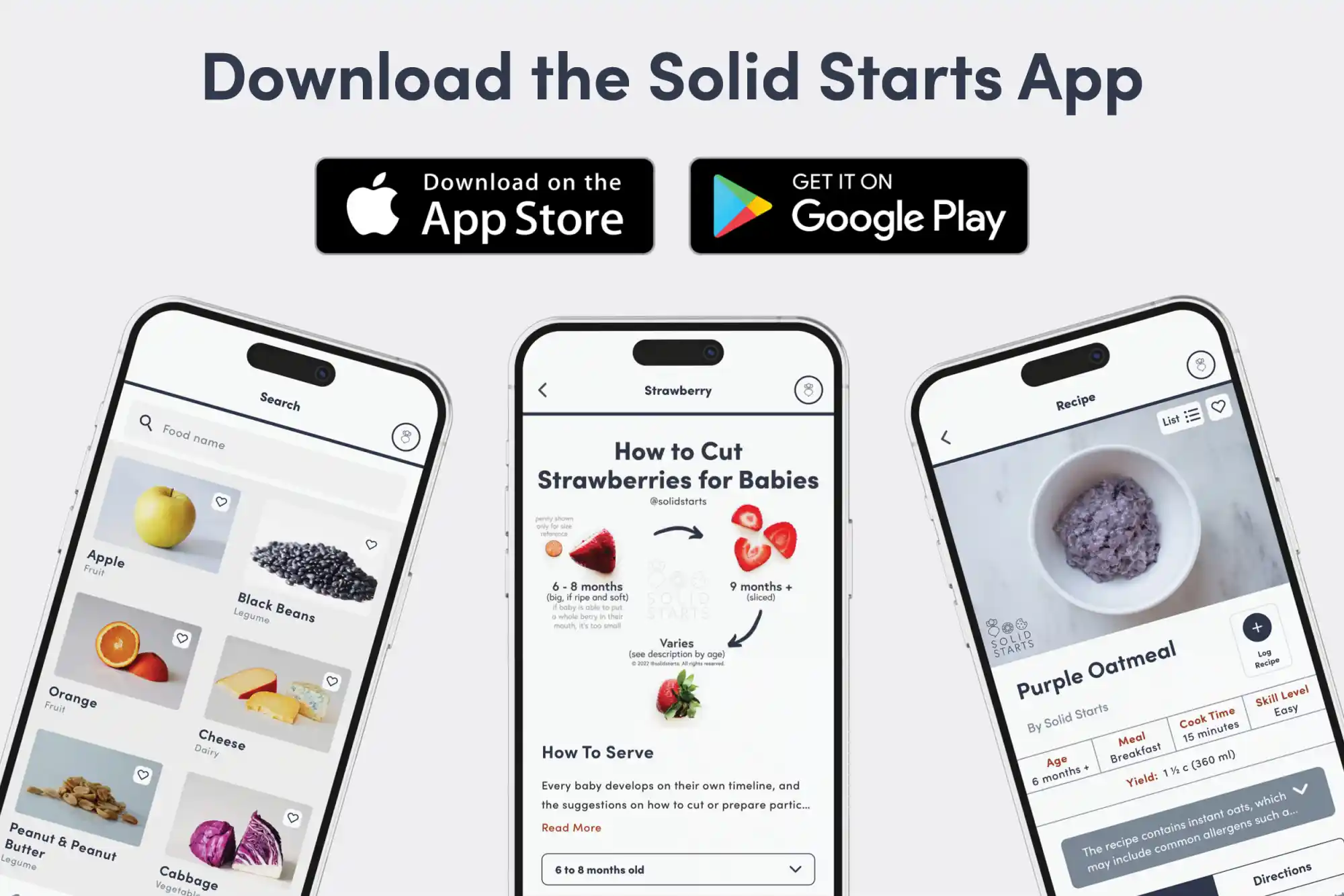Dates
Fruit
Age Suggestion
6 months
Iron-Rich
No
Common Allergen
No

When can babies have dates?
Dates may be introduced as soon as baby is ready to start solids, which is generally around 6 months of age.
Dates are the fruit of a palm tree from North Africa and Southwest Asia. For generations, dates have been a staple food for the diverse cultures of these regions. Some are eaten fresh while others are dried to concentrate the sweetness. Dates are also often processed to make sweeteners like date sugar and date syrup.
Are dates healthy for babies?
Yes. Both fresh and dried dates are rich in carbohydrates and fiber, with a variety of nutrients such as potassium, folate, and vitamin B6. Plus, they’re rich in phytochemicals that may offer antioxidant benefits and support bodily resilience. Together, these nutrients work to provide energy, support the digestive system, electrolyte balance, neurodevelopment, and healthy metabolism, and more.
When fresh dates are dried, they lose water content, and as a result, the natural fruit sugars become more concentrated. Natural sugar in both fresh fruit and dried fruit is not a concern in a balanced diet.
Are dates a common allergen?
No. Dates are not a common food allergen, although serious reactions have been reported. Individuals with pollen allergy or the related Oral Allergy Syndrome (also known as pollen-food allergy) may be sensitive to dates. As with any potential allergen, introduce a scant quantity at first and watch closely as baby eats. If there is no adverse reaction, gradually increase the quantity in following servings.
Are dates a choking hazard for babies?
Yes. Some varieties of fresh dates can be firm or crunchy, and dried dates are sticky and challenging to chew, which are qualities that increase the risk of choking. Dates can also have hard, inedible pits that are a choking hazard if not removed. To reduce the risk, make sure to remove the pit and prepare and serve dates in an age-appropriate way. As always, make sure you create a safe eating environment and stay within an arm’s reach of baby during meals.
Learn the signs of choking and gagging and more about choking first aid in our free guides, Infant Rescue and Toddler Rescue.
How do you serve dates to babies?
Every baby develops on their own timeline, and the suggestions on how to cut or prepare particular foods are generalizations for a broad audience.
6 months old +:
Remove any remaining pits from whole, dried dates and rehydrate the fruit in hot water for 10 to 15 minutes. Once the fruit is fully softened, finely chop, mash, or puree. Serve the dates on their own or mixed into other foods, such as oatmeal or yogurt. Consider starting with a small amount and increasing the serving size as tolerated by baby – dates have lots of fiber and can cause some uncomfortable gas or blowouts.
Large fresh dates can be served whole as long as they are very soft. The date should mash readily when gently pressed between thumb and pointer finger. Firm and crunchy date varieties should be cooked until fully soft or reserved until the child is older.
12 months old +:
Serve rehydrated, fully softened dried dates in small pieces, blended into a puree and offered on its own, or mixed into other scoopable foods.
You can also offer fresh dates in bite-sized pieces as long as they are very soft. The date should mash readily when gently pressed between thumb and pointer finger. Firm and crunchy date varieties should be cooked until fully soft or reserved until the child is older.
18 months old +:
At this age, many toddlers may now have the molars and the biting, tearing, and chewing skills needed to eat a whole large dried date. Start by making sure the pit has been removed from the date. To model how to eat whole dates, start by telling the child: "This is a hard one. Watch me." Then, show the toddler how to place the fruit in-between your front teeth. Hold it between your teeth and exaggerate taking a small bite. Then, show how you move the piece to your molars with your tongue. Chew with your mouth open (you can even demonstrate by opening and closing your hands at the same time). Once you have chewed the date well, open your mouth to show the toddler how it has been broken down. Say, "I moved it to my big strong teeth to chew it. It needs a lot of chewing." Demonstrate a couple of times before offering the toddler a date to do the same.
To coach the child through eating a whole date, say, "Your turn to try." For the very first attempt, consider holding on to the date for the child to take a bite from it (without you letting go of the prune). Don't let go until they have used their teeth to actively take a bite. This ensures that they initiate chewing. Continue but only serve one or two dates at a time to pace the practice. If the child insists on holding the fruit themselves, allow them to self-feed and take a bite if you feel comfortable. If you do not feel comfortable or if the child does not bite or attempt to break down the date, we recommend waiting a few weeks more to practice chewing other foods that are less challenging and refraining from cutting the date into smaller pieces: if the child is not chewing thoroughly or listening to directions, these small pieces may actually be riskier and more likely to be shoveled in the mouth.
Written by
Expert Tips Delivered to Your Inbox
Sign up for weekly tips, recipes and more!
The content offered on SolidStarts.com is for informational purposes only. Solidstarts is not engaged in rendering professional advice, whether medical or otherwise, to individual users or their children or families. No content on this site, regardless of date, should ever be used as a substitute for direct medical advice from your doctor or your medical or health professional, nutritionist, or expert in pediatric feeding and eating. By accessing the content on SolidStarts.com, you acknowledge and agree that you are accepting the responsibility for your child’s health and well-being. In return for providing you with an array of content “baby-led weaning” information, you waive any claims that you or your child may have as a result of utilizing the content on SolidStarts.com.





